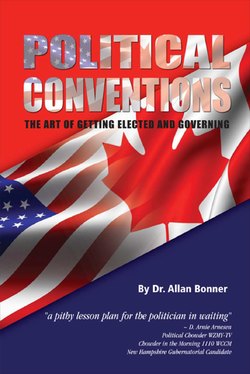Читать книгу Political Conventions - Allan Bonner - Страница 3
На сайте Литреса книга снята с продажи.
Foreword
ОглавлениеAllan's fifth book is early and a different book from the one I wanted to publish. It's also more timely and better.
After the success of his compilation of magazine and newspaper essays entitled Political Columns—Behind the Scenes with Powerful People,
I naturally asked for a sequel.
Allan continued writing and addressed a few issues not covered in Political Columns—including nuances of media relations and ways to win elections, make speeches and govern. We knew there could be a Canadian election at any time, so his take on websites, blogs, advertising, leaders’ debates, fundraising and all the other tools of campaigning would be well received.
But then came the American political season. Allan had visited campaign headquarters in New York and New Hampshire, and this experience motivated him to write a few columns. He was asked to do commentary on the presidential debates for PBS, and his notes and research resulted in more columns for The Hill Times—Ottawa’s political newspaper. New Hampshire public radio asked Allan for analysis on both conventions, and his hours on “The Exchange” gave him a great opportunity to test his observations.
Allan is known for hard work and research. Captivated by the most exciting presidential race since 1968 or 1948 or 1860 or perhaps ever, he took on the task of reading every inaugural address in American history, every major campaign speech and the State of the Union addresses. On his drives to presidential debates in New Hampshire, campaign offices in New York, and flights to and from the Democratic national convention in Denver, he listened to university lectures on the American Revolution, settlement history, politics, presidential history and anything else he could get his hands on. The more he listened, the more ideas he got.
It soon became clear that this book needed to focus more on the American election and political process. The title, Political Conventions, is a play on words. Allan identifies the conventions needed to campaign successfully. He deals with the conventions required to make a successful speech and those needed for governing. He often challenges conventional wisdom.
This is a “how to” book, but it has more dimensions to it. Politicians and political aides can read great advice on how to succeed, but anyone who has to communicate and motivate others will also learn lessons from this book. Political speakers will see the research they must engage in to ensure they are touching the historical and political bases that achieve success. They must also consider what other bases they must touch in their own jurisdictions. This book will help them.
As in his other books, Allan draws on his own experiences as one who helps a politician, diplomat or spokesperson every week in his training and consulting business. Sextant Publishing is happy that this book is different and early. It is in the tradition of this publishing house and its parent company, Cambridge Strategies. We want to foster intelligent, timely, public discussion and elevate the political discourse.
We want you to share our excitement with politics and public policy.
Ken Chapman
Edmonton, Alberta
